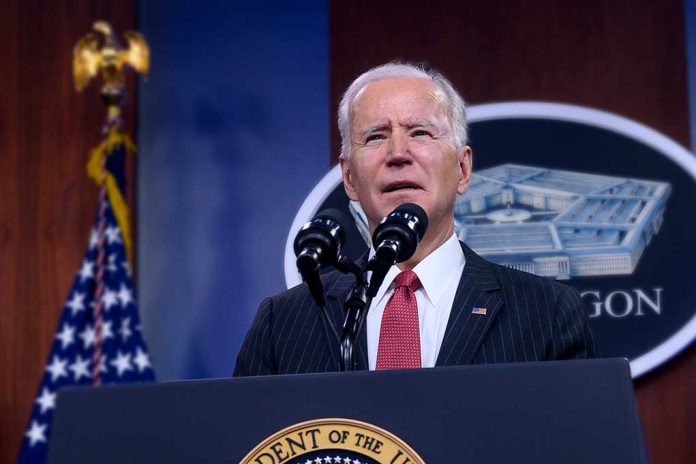
President Biden’s support for a congressional stock trading ban sparks debate on government ethics and transparency.
At a Glance
- Biden endorses bipartisan efforts to restrict stock trading by Congress members
- The president questions the ethics of lawmakers trading stocks with insider knowledge
- A bipartisan group of Senators introduced legislation to ban stock trading for Congress members, their spouses, and dependents
- This marks Biden’s first public stance on the issue, having previously avoided the topic
- The proposed ETHICS Act includes penalties for violations and extends to the president and vice president
Biden Takes a Stand on Congressional Stock Trading
President Joe Biden has publicly endorsed efforts to restrict stock trading by members of Congress, marking a significant shift in his stance on government ethics. In a recent interview with A More Perfect Union, Biden expressed his support for bipartisan calls to end stock trading for congressional members, their spouses, and dependents. This move aligns with ongoing legislative proposals aimed at curbing potential conflicts of interest and enhancing transparency in government.
Biden’s endorsement comes amid growing concerns about ethical standards in government, particularly regarding the potential for lawmakers to profit from insider knowledge gained through their positions. The president’s stance is clear:
“I don’t know how you look your constituents in the eye and know because of the job they gave you, gave you an inside track to make more money. I think we should be changing the law.” Biden said.
The ETHICS Act and Its Implications
A bipartisan group of Senators has introduced the ETHICS Act, a comprehensive piece of legislation aimed at banning stock trading for Congress members, their spouses, and dependent children. The proposed law would also extend to the president and vice president, requiring them to divest from stocks. This legislation, if passed, would represent a significant step towards addressing longstanding concerns about potential conflicts of interest in government.
“a commonsense piece of legislation that helps maintain trust in this institution.” – Sen. Gary Peters, D-Mich.
The ETHICS Act includes penalties for violations and has not yet been voted on by the full Senate. It would prevent lawmakers from buying stocks and other financial assets and restrict them from selling stocks 90 days after the law’s enactment. This comprehensive approach aims to address the growing concerns raised by ethics watchdogs about stock trading by government officials.
President Biden endorses congressional stock trading ban https://t.co/3W0HOx3rel
— The Hill (@thehill) December 18, 2024
Historical Context and Public Perception
The issue of congressional stock trading has been a contentious one, with allegations of profiting from insider knowledge surfacing repeatedly. In 2012, former President Barack Obama signed a bill to prevent insider trading by Congress members and increase reporting requirements. However, concerns have persisted, leading to the current push for more stringent regulations.
“Nobody in the Congress should be able to make money in the stock market while they’re in the Congress.” – Biden
Biden’s support for the ban is particularly noteworthy given his personal history. As a senator, Biden did not own stock, a fact that lends credibility to his current stance. This move is seen as an effort to address public concerns about ethical standards in government and to restore trust in elected officials.
Biden supports a ban on congressional stock trading https://t.co/mc58yyY1CX
— Post Politics (@postpolitics) December 17, 2024
Broader Economic Context
While discussing the stock trading ban, Biden also touched on broader economic issues facing the country. He criticized corporate greed and the outsourcing of labor for cheaper production costs, highlighting the impact on American workers. The president acknowledged ongoing high prices for basic goods post-pandemic and the public’s frustration with the economic situation.
Biden highlighted his administration’s efforts to address economic challenges, including the implementation of the CHIPS and Science Act and its potential for job creation. He also pointed to the administration’s success in providing over $175 billion in debt relief for more than 4.8 million Americans, focusing on those in public service loan relief programs and victims of college fraud.
As the debate over congressional stock trading continues, Biden’s endorsement of the ban represents a significant moment in the ongoing discussion about government ethics and transparency. The coming months will likely see further developments as Congress grapples with this complex and politically sensitive issue.
Sources:
- Biden backs calls to ban congressional stock trading
- Biden says he supports a congressional stock trading ban
- Biden endorses congressional stock trading ban
- Biden backs calls to ban congressional stock trading



